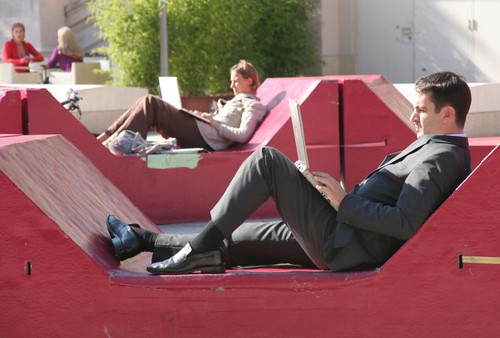We have a lot of flexibility around where and how we can choose to work as freelance translators. Sometimes we forget that we need to make the right choice for our individual set of circumstances, and that these choices will change along with our circumstances throughout our careers.
Last year I spent months running my office from just a laptop and a small folder when I was moving between London and Brisbane. I became a master of digitising, synchronising and reducing, and of setting up functioning workspaces in the least likely of places. While this was a great exercise in mobile working and streamlining more generally, it also made me realise a couple of things:
- It is possible to proofread from a screen just as effectively as from a print out. However it requires a very different kind of concentration and it may not be suited to everyone. I’m glad I’ve tested this and found it to be an option for me, but for now I still prefer to proofread from paper (recycled and re-used, of course).
- Running a mobile translation office requires more fixed infrastructure than you might think. Working from a coffee shop is fun and definitely doable, but I’m not convinced it’s a long-term sustainable option for professional translators just yet. There really is a limit to the number of days you can tolerate the vagaries of virtual working – intermittant internet connections, dodgy power supplies, etc. – and still put in a decent day’s work (and that’s based on my experiences in four technologically advanced countries). If you’re translating full time and on a permanent basis you’ll need to focus on being productive, not pared down, so plan regular sessions at a “docked” workstation.
- It also requires a lot more energy. I found I could run my office from a laptop bag for only so long before the occupational hazards of RSI, fatigue and general burn-out became dangerously familiar bedfellows. It doesn’t matter how much you love being mobile, you need to preserve your mental and physical energies for battles that really are worth fighting. A physical headquarters of some kind will help you stay the course in your business, so it’s worth commandeering a corner of a room, a co-working space, or even a regular spot in an internet café if you have to.
- Printed newspapers will never be obsolete. It doesn’t matter how tech-savvy you are. When *every* element of your work involves staring at a screen, you start to crave the luxury of a one-way interaction with a sheet of good old-fashioned paper.
I still love the flexibility of mobile working but I also have a new-found appreciation for my physical office space. The challenge now is to set up my office with just the right mix of mobile and traditional elements to suit the current stage of my professional and personal life.
I’d love to know what changes you have found yourself making to your home office to suit your evolving professional and personal needs. (After all, that’s the point of being your own office manager too, right?) Let me know in the comments below.
